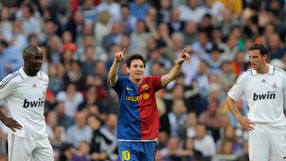
With contracts worth around 120 million euros each a year, the big two rake in around half the income from the country's television pot, leaving clubs such as Sevilla, Atletico Madrid and Valencia, who should be challenging for titles, to fight over the scraps.
The glaring duopoly, which the pair are unlikely to relinquish soon, gives them a huge advantage over their domestic peers in the transfer market, as shown by this summer's unprecedented spending spree.
Last season's runners-up Real lavished a staggering 250 million euros on players including Cristiano Ronaldo and Kaka, while champions Barca will have splurged around 100 million assuming their purchase of defender Dmytro Chygrynskiy from Shakhtar Donetsk goes through.
Valencia, the last side apart from Real and Barca to win La Liga, in 2003/04, have spent some 7.5 million.
"The fact that most clubs negotiate their TV contracts individually creates an enormous disparity which logically translates into a progressive increase in competitive imbalance," said Angel Barajas, a professor of finance and accounting at the University of Vigo and an expert on the economics of football.
"Considering the earning capacity of Spain's more modest clubs, it is difficult for them to build a squad that can be anywhere near the level of the big two," Barajas told Reuters ahead of the start of the 2009/10 season on Saturday.
"They may have a chance in knockout competitions but the rest of the clubs can do little to keep up in competitions where regular matches are played over a season."
The best features, fun and footballing quizzes, straight to your inbox every week.
FINANCIAL POLARISATION
Rival leagues in England, Germany and France already have a system of revenue-sharing in place and Italy is set to come into line in 2010.
In the English Premier League, 50 percent of the cash is shared equally among the 20 clubs, a quarter of it paid out depending on how many times the club are shown live and the remaining quarter distributed based on final places in the table.
"The collective sale of TV rights has served the Premier League extremely well since it was conceived and we'd be absolutely against breaking the current model," Chelsea chief executive Peter Kenyon told Reuters this month.
Maintaining the system was crucial to preventing further financial polarisation and keeping the Premier League ahead of La Liga, Kenyon said.
Spain's professional clubs association (LFP) essentially backs the introduction of collective bargaining but recognises that changing the status quo and persuading Barca and Real to accept a different system would be very difficult.
"We believe collective bargaining of TV rights is always the best means of securing a better overall contract," Juan Carlos Santamaria Gonzalez, an LFP spokesman, told Reuters.
"There would have to be very detailed discussion about any model for revenue sharing," he added.
"It doesn't appear to be easy to find a satisfactory model as things stand."
AVOID DISTORTION
Barajas at the University of Vigo said one way to address the imbalance in Spain could be to set limits on how much clubs could spend on wages and amortisation of transfer costs.
"This or any similar measures would have to be done at the European level to avoid distortion between countries," he said.
UEFA president Michel Platini on Thursday outlined planned rules that would aim to prevent clubs living beyond their means, although they would not come into force until at least 2012.
"We have everyone on board with this, the ow
 Join The Club
Join The Club





